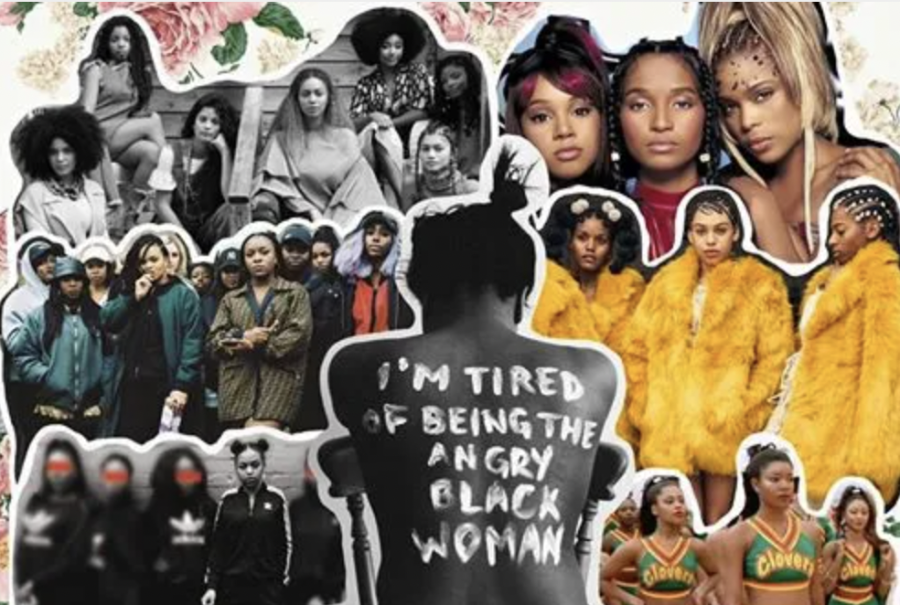Changing the Narrative for Young Black Women
Young black women face an uphill climb when trying to surpass the stereotypes society has used to suppress them throughout history.
Despite the efforts of Martin Luther King Jr., Rosa Parks, and Sojourner Truth, racism is still a common sight all around the world, in nearly every country and every society. At the crux of this incessant racial discrimination is young Black women. Many people see women as a billboard call to scrutiny, but when the woman is a person of color, particularly Black, they are considerably more of a target to the world’s harsh commenting. These people are fighting the war of being colored within the war of being female.
The stereotypes surrounding Black women have, over the years, gotten worse. As author Deborah Gray White notes in her book, ‘Arn’t I a Woman?: Female Slaves in the Plantation South,’ the angry Black woman stereotype started with chattel slavery and is deeply rooted in American culture. The ‘welfare queen’ stereotype, deeming single, Black mothers as selfish and child endangering was prompted by Ronald Reagan’s presidential campaign in 1976. Sophomore, Gracian Sieni, believes a lot of these stereotypes have contributed to making Black girls feel like they have an expected social image that they have to keep up, in an effort to not be called white-washed.
“It’s created a stereotype of how Black girls are supposed to be,” said Sieni. “Like with the whole ‘Hot Cheeto girl’ thing. That was literally a stereotype making fun of Black girls, and it was funny at the moment but I feel like now because of what society has done, if you don’t act that way they say they’re too whitewashed, talk too properly, or don’t talk Black. And so whenever they see a Black girl who doesn’t act like that, which there’s nothing wrong with it if that’s your personality, but if they don’t people think you’re white washed.”
Often, Black women are subject to hypersexulization at the hands of their society and also their immediate and extended family. This constant sexism has surrounded Black women for decades and in many black households girls grow up feeling like they have to shelter themselves from the gaze they seem to always be under, according to elders.
“They tell Black girls, ‘companys coming over, cover yourself’ or if they wear makeup they say they’re ‘growing up too fast.’ Especially if they’re going through puberty or something, people say they’re ‘grown’ even though they can’t really control that,” said Sieni.
Not only do Black women have to constantly go through being hypersexualized, they are also defeminized when they don’t fit society’s standards as a woman. Everything they choose to do is dissected under a microscopic lens by anyone with an opinion. Sophomore, Esther Adegoke, is angry that Black women must be limited to a singular definition of beauty.
“For Black girls, there’s a way society has of identifying them. For example, the way they dress, the way they do their hair, whether they’re masculine or feminine. It gives a narrative and when we, young black girls, go out into society we’re not always comfortable with how we look. We’re made to think that if you wear wigs it’s not your real hair, that you should express your natural hair but then if you wear your natural hair it’s ‘unkept’ and ‘unhealthy.’ It defines your beauty. When Black women cut their hair they’re defined as masculine, defined as not pretty or attractive. It’s just too much when people place a narrative on Black women, especially for younger generations because they want to be free and do what they want to do, but when they’re hit with this narrative it confuses them, and most times it comes from the family,” said Adegoke.
More often than not, girls hear these things from their own families. As they grow up with it drilled in their heads that they have to be a certain way, they sometimes lose value for themselves. Freshman, Ameerah Yangala, has on more than one occasion realized that as a Black woman, she is seen differently.
“Once, I tried to twist my hair and my mom said in the future people might not let me get a job because of things like this. It’s really common and I think that’s harmful for young Black girls. It can damage their view about themselves,” Yangala said.
Adegoke believes that this narrative can be changed from the inside, if Black parents and elders stop installing a specific mindset in their children’s minds and simply teach them their culture, then let them grow how they are meant to.
“Black families can be strong headed and say ‘do what you want to do.’ ‘Dress how you want to dress and act how you want to act,’” said Adegoke. “They should start telling their children from a young age that, and not what society tries to tell them.”


